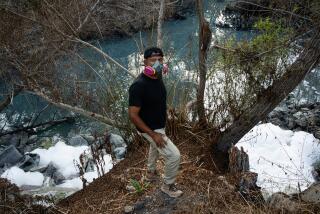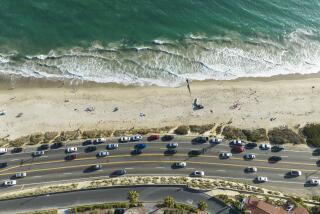Grease, Sewage Problem Solved
Laguna Beach, a city once so plagued with sewage spills caused by restaurant grease that the state fined it $60,000, announced recently that an aggressive campaign to clean up its image has prevented all such spills for more than a year.
“This is an amazing turnaround,” said Assistant City Manager John Pietig. Spills from overflowing sewage lines blocked by restaurant grease -- often polluting beaches and the ocean -- are “virtually not a problem at all.”
City officials, restaurant owners and environmental groups took steps to reverse the problem, blamed on an aging sewer system and an abundance of restaurants downtown. The solution included a program to educate and train hotel and restaurant employees how to dispose of grease without putting it in the sewer system. Restaurant owners agreed to stop using garbage disposals -- which send grease and chopped food waste down the drain -- and the city is cleaning downtown sewer lines more often.
Officials say the results appear to justify the city’s decision not to require the installation of grease interceptor devices at each of the city’s 105 restaurants, which the city initially favored.
Clean-water advocates, however, are cautious in their assessment.
“I feel that it’s too soon to declare the battle to remove grease from our system is over,” said Roger von Butow, chairman of the Clean Water Now coalition. “We’re looking at a snapshot, and we need a more long-term result to confirm that in fact we have eliminated the problem.”
From 1997 through 2001, at least 60 of about 350 sewage spills were started by grease, Pietig said, far more than an acceptable level by the San Diego Regional Water Quality Control Board, a state agency. Only the clogging of sewer lines by tree roots caused more spills.
Spills from the 1930s-era sewer system had become so frequent that in June 2001, the water board fined the city for violating clean-water laws. To combat the problem, the City Council in August of that year voted to require restaurants to install grease interceptors, which typically cost at least $15,000.
Restaurant owners appealed, arguing that the expense would run many smaller operations out of business.
Meetings with environmental groups and restaurant owners produced the training and education program as an alternative. As part of a June 2002 ordinance, the program provides English and Spanish instructions for employees to put food waste in the trash rather than sending it down the drain. Employees were also trained how to handle grease spills.
Hotel and restaurant employees were trained in December and inspections began in January, Pietig said.
After two rounds of inspections, 87 of 105 restaurants were found to comply with the new ordinance, he said. Ten $50 citations were issued for businesses significantly out of compliance.
Restaurant owners applauded the city’s willingness to compromise. Bobby Fader, general manager of the Tivoli and Tivoli II restaurants, said the 50 employees in total, “from the wait-staff to the busboys to the dishwashers to the cooks, are more aware of what the responsibilities are.”
The clean-water proponents say that, although they’re grateful for the improvement, they aren’t so sure that the initial success of the program will last.
“With the high turnover you typically have with restaurant employees, we’re concerned that it’s just a matter of time that the training wears off and the new employees aren’t trained and they start to have problems,” said Rick Wilson of the Surfrider Foundation.
The city’s more frequent cleaning of sewer pipes might also be a factor, Wilson said.
More to Read
Sign up for Essential California
The most important California stories and recommendations in your inbox every morning.
You may occasionally receive promotional content from the Los Angeles Times.










